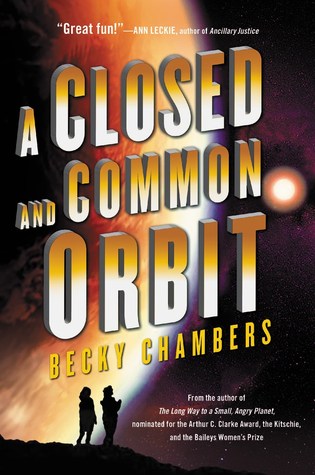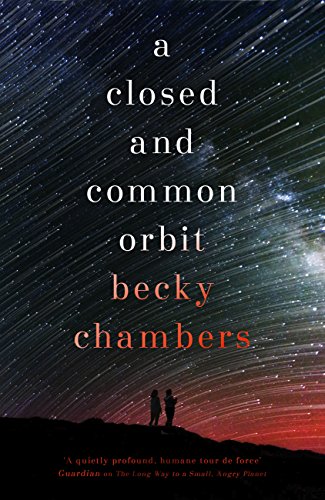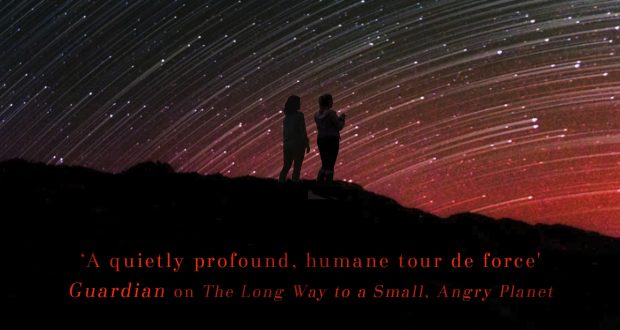What rights should artificial intelligence have? Are they more than just the sum of their code? Can AIs love?
Any science fiction fan worth their salt has pondered these questions at length. And these questions pop up time and again in popular SF to varying degrees of success. Unsurprisingly, Becky Chambers follow-up to The Long Way to a Small, Angry Planet is as exceptional as her debut. This was no one-hit-wonder, no one-trick pony. Chambers is a true talent and writer to watch.
Most sapients confuse working hard with being miserable.
 Rather than a traditional sequel route, Chambers chose to explore other characters within the world she created. After all, why put all that fantastic world building to waste? A Closed and Common Orbit picks up from the end of its predecessor (spoilers…) with Lovelace now installed in her own artificial body, or ‘kit’. As Lovelace, who decides to call herself Sidra, learns to exist within the confines of a humanoid body, she must also navigate the world of social interaction. Alongside Sidra’s story, we are given the backstory for Pepper. Pepper came into life as a genetically engineered human for use in factory work. After escaping, she is raised by an ancient AI in an abandoned shuttle.
Rather than a traditional sequel route, Chambers chose to explore other characters within the world she created. After all, why put all that fantastic world building to waste? A Closed and Common Orbit picks up from the end of its predecessor (spoilers…) with Lovelace now installed in her own artificial body, or ‘kit’. As Lovelace, who decides to call herself Sidra, learns to exist within the confines of a humanoid body, she must also navigate the world of social interaction. Alongside Sidra’s story, we are given the backstory for Pepper. Pepper came into life as a genetically engineered human for use in factory work. After escaping, she is raised by an ancient AI in an abandoned shuttle.
Both stories converge on ideas of what it means to be an AI and whether an emotional experience is really something they are capable of. Do ‘human’ rights apply to AIs… should they?
Chambers has a gift when it comes to tackling big questions. She is never condescending or belligerent with the point she is trying to make. The story unfolds to show the reader how AIs can exist as more than just code. On top of that, the metaphor for having your body not match your mind is explored with the care and respect it should be, while never feeling preachy. The ‘messages’ are never expressed at the expense of character or plot and everything is done with such a light touch.
Owl had said it was important to know how swearing worked, and it was okay under the right circumstances, but that Jane shouldn’t swear all the time. Jane definitely swore all the time. She didn’t know why, but swearing felt fucking great.
 One complaint I might have had turned into a strength, completely baffling this reviewer. When Pepper first escapes, she has a very limited understanding of the world around her nor has she been educated to use language properly. Chambers uses a particular tick of language (‘real good’, ‘real well’, etc) to convey this. At first, this irritated me. It was so jarring from the rest of the prose and was a tad overused. But as you read on, you realise that the language begins to gradually improve. Pepper’s character has evolved and learned so naturally that you barely realised what was happening until it was already done and dusted.
One complaint I might have had turned into a strength, completely baffling this reviewer. When Pepper first escapes, she has a very limited understanding of the world around her nor has she been educated to use language properly. Chambers uses a particular tick of language (‘real good’, ‘real well’, etc) to convey this. At first, this irritated me. It was so jarring from the rest of the prose and was a tad overused. But as you read on, you realise that the language begins to gradually improve. Pepper’s character has evolved and learned so naturally that you barely realised what was happening until it was already done and dusted.
Chambers Wayfarers series is the feel-good science fiction series you were looking for. Depressing dystopias got you down? Here’s the antidote.
Verdict: More fun in space with Chambers’ eclectic cast of species. This is optimistic science fiction for those who grew up on Original Series Star Trek.
 Pop Verse Pop Culture Universe
Pop Verse Pop Culture Universe






